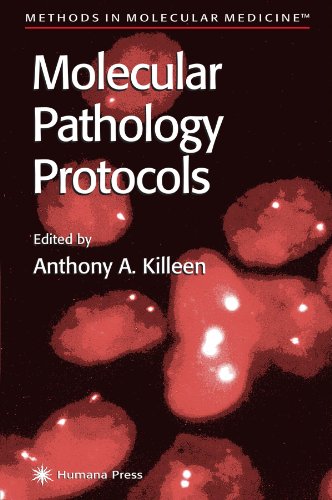图书简介
The era of molecular pathology has arrived. From its promising beg- nings in research laboratories, the field has grown, and continues to grow, to become a vital part of the care of an ever-increasing number of patients. Because of its recent emergence from the research taboratory, many molecuIar pathology protocols we still to be found in the primary litcramre, and have not appeared in a text. MO~PCU~Q~ Padhoiogy Protocob contains la- ratory protocoIs that have been developed by many of the authors for use in clinical molecular pathology laboratories and describe in detail Row to perform these assays. This book is therefore intended for clinical laboratory use by medical technologists and pathologists. It will dso be of interest to research workers who are performing these assays. In its broadest meaning, pathology is the study of disease, and therefore it follows that any disease for which the molecular basis is understood would be suitable as a topic for inclusion in this work. When seiecting protocols, it was necessary to place limits on the number of chapters that could be feasibly presented in a single work. Those protoculs that were selected are performed more frequently, or have achieved recognition as having important diagnostic utility in contemporary practice. A decision was made to exclude inherited genetic diseases with certain exceptions, such as those diseases that are associated with thrombotic states and are part of the traditional dumain of pathology.
DNA Extraction from Paraffin-Embedded Tissues.- DNA Extraction from Fresh or Frozen Tissues.- RNA Extraction from Fresh or Frozen Tissues.- Single-Strand Conformation Polymorphism Analysis of Mutations in Exons 4-8 of the TP53 Gene.- Cleavase® Fragment Length Polymorphism Analysis for Genotyping and Mutation Detection.- Detection of Telomerase by In Situ Hybridization and by the Polymerase Chain Reaction-Based Telomerase Activity Assay.- Detection of Microsatellite Instability.- Polymerase Chain Reaction Clonality Assays Based on X-Linked Genes.- Fluorescent In Situ Hybridization.- HER-2/neu Oncogene Amplification Determined by Fluorescence In Situ Hybridization.- A Nested Reverse Transcription-Polymerase Chain Reaction Assay to Detect BCR/abl.- Detection of t(15;17)(q24;q21), inv(16)/t(16;16)(p13;q22), and t(8;21)(q22;q22) Anomalies in Acute Myeloid Leukemias.- Detection of t(14; 18)(q32;q21)-Associated BCL-2/JH Gene Fusion in Non-Hodgkin Lymphoma.- Detection of Breast Cancer Cells Using Immunomagnetic Beads and Reverse Transcriptase Polymerase Chain Reaction.- Molecular Detection of Circulating Prostate Cancer Cells.- Methods to Detect Clonal Gene Rearrangements in Lymphomas and Leukemias.- Monitoring of Bone Marrow Transplant Engraftment.- Direct Molecular Diagnosis of Multiple Endocrine Neoplasia Type 1.- Molecular Detection of Multiple Endocrine Neoplasia Type 2.- Assay for Detecting the I1307K Susceptibility Allele within the Adenomatous Polyposis ColiGene.- Detection of Human Papillomaviruses by Polymerase Chain Reaction and In Situ Hybridization.- Molecular Methods for Detecting Epstein-Barr Virus (Part I).- Molecular Methods for Detecting Epstein-Barr Virus (Part II).- Molecular Methods for Detecting Epstein-Barr Virus (Part III).- Molecular Detection of Kaposi?s Sarcoma-Associated Herpesvirus/ Human Herpesvirus-8.- Diagnostic Applications of Quantitative Polymerase Chain Reaction for Cytomegalovirus.- A Colorimetric Microtiter Plate Polymerase Chain Reaction System That Detects Herpes Simplex Virus in Cerebrospinal Fluid and Discriminates Genotypes 1 and 2.- Detection and Typing of Hepatitis C Virus.- Detection and Speciation of Mycobacteria in Formalin-Fixed, Paraffin-Embedded Tissue Sections.- Ultrasensitive Quantitation of Human Immunodeficiency Virus Type 1 RNA in Plasma by the AMPLICOR and COBAS AMPLICOR HIV-1 MONITOR? Tests.- Molecular Diagnosis of Hereditary Thrombotic Disorders.- Prenatal Genotyping of the RhD Locus to Identify Fetuses at Risk for Hemolytic Disease of the Newborn.- Molecular Diagnosis of Hereditary Hemochromatosis.- Genotyping of Apolipoprotein E.- Genotyping for Functionally Important Human CYP2D6*4 (B) Mutation Using TaqMan Probes.
Trade Policy 买家须知
- 关于产品:
- ● 正版保障:本网站隶属于中国国际图书贸易集团公司,确保所有图书都是100%正版。
- ● 环保纸张:进口图书大多使用的都是环保轻型张,颜色偏黄,重量比较轻。
- ● 毛边版:即书翻页的地方,故意做成了参差不齐的样子,一般为精装版,更具收藏价值。
关于退换货:- 由于预订产品的特殊性,采购订单正式发订后,买方不得无故取消全部或部分产品的订购。
- 由于进口图书的特殊性,发生以下情况的,请直接拒收货物,由快递返回:
- ● 外包装破损/发错货/少发货/图书外观破损/图书配件不全(例如:光盘等)
并请在工作日通过电话400-008-1110联系我们。
- 签收后,如发生以下情况,请在签收后的5个工作日内联系客服办理退换货:
- ● 缺页/错页/错印/脱线
关于发货时间:- 一般情况下:
- ●【现货】 下单后48小时内由北京(库房)发出快递。
- ●【预订】【预售】下单后国外发货,到货时间预计5-8周左右,店铺默认中通快递,如需顺丰快递邮费到付。
- ● 需要开具发票的客户,发货时间可能在上述基础上再延后1-2个工作日(紧急发票需求,请联系010-68433105/3213);
- ● 如遇其他特殊原因,对发货时间有影响的,我们会第一时间在网站公告,敬请留意。
关于到货时间:- 由于进口图书入境入库后,都是委托第三方快递发货,所以我们只能保证在规定时间内发出,但无法为您保证确切的到货时间。
- ● 主要城市一般2-4天
- ● 偏远地区一般4-7天
关于接听咨询电话的时间:- 010-68433105/3213正常接听咨询电话的时间为:周一至周五上午8:30~下午5:00,周六、日及法定节假日休息,将无法接听来电,敬请谅解。
- 其它时间您也可以通过邮件联系我们:customer@readgo.cn,工作日会优先处理。
关于快递:- ● 已付款订单:主要由中通、宅急送负责派送,订单进度查询请拨打010-68433105/3213。
本书暂无推荐
本书暂无推荐










































